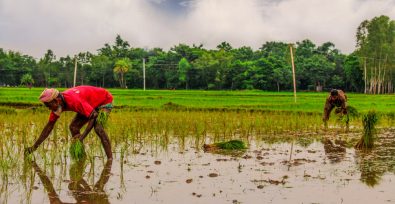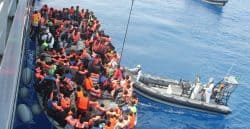Bangladesh is one of the most vulnerable countries to climate change. And according to new research by the International Institute for Environment and Development (IIED), the lack of climate resilient infrastructure and a social safety net is leaving Bangladeshi climate migrants paying the price. Climate Home News reports the study found almost all Bangladeshi migrants who leave to find work in other areas of the country or overseas in Gulf States are landing in some form of modern slavery.
Cyclones, floods and a vicious cycle of vulnerability
According to recent global weather analysis, extreme weather events that lead to disaster have gone up from an average of four, to a shocking seven per year. In Bangladesh that means more flash floods coupled with creeping sea-level, and salinity rise. With their farmland and fresh drinking water ruined, many subsistence households face the choice to starve or leave.
Chiara Soletti, a climate change advocacy manager at Anti-Slavery International stated:
“When migration happens under distressing conditions without choice or proper safeguards, the risk of exploitation and modern slavery increases significantly.”
Researchers conducted dozens of interviews and surveyed nearly 650 households in two of the hardest hit districts in Bangladesh. Almost all of those interviewed reported at least one family member had been forced to leave to find work elsewhere. Regardless of whether they sought work in other areas of the country or overseas in Gulf countries, the result was the same. Nine out of every ten migrants experienced some form of modern slavery.
Selling their things and leaving home- it’s a “life gamble”
In 2013, the ILO created a list of indicators of forced labor, a form of modern slavery. These include withholding of wages, physical violence, restricted movement and debt bondage. A horrific 92% of those who migrated internally said they experienced at least one of the indicators on the list. Disturbingly, more than half experienced three or more.
Soletti said:
“These forms of modern slavery often arise due to a combination of factors, including…the absence of safe migration pathways and inadequate human rights protection through the migration route,”
Migrants who decided to leave the country often took on debt to fund the move, “gambling” on being able to improve their income. Instead, most found themselves trapped in one or more forms of modern slavery. According to the research, of the Bangladeshi migrants who went overseas to seek work, virtually all reported experiencing at least one form of modern slavery. Tragically, two-thirds reported experiencing six or more.
Migrants listed threats, intimidation, physical violence, or abusive living and working conditions as topping the list of atrocities. And with nothing to come back to in Bangladesh, their “life gamble” resulted in a downward spiral from climate impacts, losses, debt and exploitation.
Modern slavery one of the harms of climate change
In Bangladesh alone, the World Bank estimates that by 2050, up to 19.9 million people will have been internally displaced due to climate change. And Bangladesh is far from the only country being negatively affected, it’s just one of earliest and hardest hit.
The IIED is calling for increasing social protection in Bangladesh before, during and after people migrate. Climate-resilient infrastructure, training to diversify incomes, and pre-disaster access to funds and food aid are urgent needs. Additionally, stronger regulation of overseas job brokers is necessary to protect migrant workers from vulnerabilities like debt bondage. All would go a long way towards helping end labor exploitation.
Freedom United stands with the IIED and those calling for modern slavery to be counted among the non-economic losses and damages caused by climate change. A sustainable livelihood shouldn’t cost someone their dignity and human rights. That’s why Freedom United is campaigning for safe migration pathways, and responsible migrant labor policies to protect those on the move from exploitation. Join us in calling for action.







Freedom United is interested in hearing from our community and welcomes relevant, informed comments, advice, and insights that advance the conversation around our campaigns and advocacy. We value inclusivity and respect within our community. To be approved, your comments should be civil.